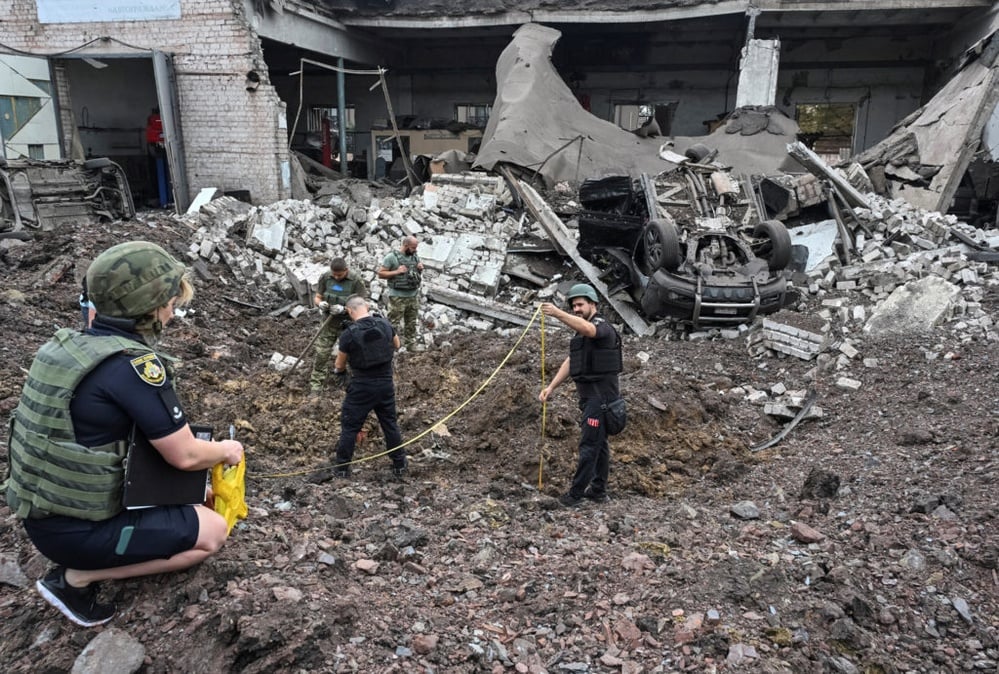
Article Bias: The article presents a government announcement regarding Iran supplying ballistic missiles to Russia, emphasizing U.S. sanctions and the perceived threat to European security, while noting both U.S. and Iranian perspectives, resulting in a somewhat critical tone towards Iran but maintaining a focus on geopolitical implications.
Social Shares: 12
🔵 Liberal <-> Conservative 🔴:
🗽 Libertarian <-> Authoritarian 🚔:
🗞️ Objective <-> Subjective 👁️ :
🚨 Sensational:
📉 Bearish <-> Bullish 📈:
📝 Prescriptive:
🕊️ Dovish <-> Hawkish 🦁:
😨 Fearful:
📞 Begging the Question:
🗣️ Gossip:
💭 Opinion:
🗳 Political:
Oversimplification:
🏛️ Appeal to Authority:
🍼 Immature:
🔄 Circular Reasoning:
👀 Covering Responses:
😢 Victimization:
😤 Overconfident:
🗑️ Spam:
✊ Ideological:
🏴 Anti-establishment <-> Pro-establishment 📺:
🙁 Negative <-> Positive 🙂:
📏📏 Double Standard:
❌ Uncredible <-> Credible ✅:
🧠 Rational <-> Irrational 🤪:
🤑 Advertising:
🤖 Written by AI:
AI Bias: Neutral perspective in data and interpretation.
Article Bias: The article presents allegations from the U.S. and U.K. against Iran for supplying missiles to Russia, reporting on sanctioned actions and responses from both sides while conveying a blend of geopolitical tensions and conflicts, suggesting a moderate bias towards Western narratives.
Social Shares: 1
🔵 Liberal <-> Conservative 🔴:
🗽 Libertarian <-> Authoritarian 🚔:
🗞️ Objective <-> Subjective 👁️ :
🚨 Sensational:
📉 Bearish <-> Bullish 📈:
📝 Prescriptive:
🕊️ Dovish <-> Hawkish 🦁:
😨 Fearful:
📞 Begging the Question:
🗣️ Gossip:
💭 Opinion:
🗳 Political:
Oversimplification:
🏛️ Appeal to Authority:
🍼 Immature:
🔄 Circular Reasoning:
👀 Covering Responses:
😢 Victimization:
😤 Overconfident:
🗑️ Spam:
✊ Ideological:
🏴 Anti-establishment <-> Pro-establishment 📺:
🙁 Negative <-> Positive 🙂:
📏📏 Double Standard:
❌ Uncredible <-> Credible ✅:
🧠 Rational <-> Irrational 🤪:
🤑 Advertising:
🤖 Written by AI:
AI Bias: No specific biases; focused on neutrality and accuracy.
Article Bias: The article presents a clear account of Iran supplying missiles to Russia amidst escalating conflicts in Ukraine, highlighting concerns from U.S. and European officials, along with the implications of these actions, which indicates a negative stance towards both Iran's actions and Russia's military operations.
Social Shares: 67
🔵 Liberal <-> Conservative 🔴:
🗽 Libertarian <-> Authoritarian 🚔:
🗞️ Objective <-> Subjective 👁️ :
🚨 Sensational:
📉 Bearish <-> Bullish 📈:
📝 Prescriptive:
🕊️ Dovish <-> Hawkish 🦁:
😨 Fearful:
📞 Begging the Question:
🗣️ Gossip:
💭 Opinion:
🗳 Political:
Oversimplification:
🏛️ Appeal to Authority:
🍼 Immature:
🔄 Circular Reasoning:
👀 Covering Responses:
😢 Victimization:
😤 Overconfident:
🗑️ Spam:
✊ Ideological:
🏴 Anti-establishment <-> Pro-establishment 📺:
🙁 Negative <-> Positive 🙂:
📏📏 Double Standard:
❌ Uncredible <-> Credible ✅:
🧠 Rational <-> Irrational 🤪:
🤑 Advertising:
🎲 Speculation:
🤖 Written by AI:
AI Bias: Neutral approach, trained on diverse datasets.
Article Bias: The article presents allegations from the U.S. and U.K. against Iran for supplying missiles to Russia, reporting on sanctioned actions and responses from both sides while conveying a blend of geopolitical tensions and conflicts, suggesting a moderate bias towards Western narratives.
Social Shares: 1
🔵 Liberal <-> Conservative 🔴:
🗽 Libertarian <-> Authoritarian 🚔:
🗞️ Objective <-> Subjective 👁️ :
🚨 Sensational:
📉 Bearish <-> Bullish 📈:
📝 Prescriptive:
🕊️ Dovish <-> Hawkish 🦁:
😨 Fearful:
📞 Begging the Question:
🗣️ Gossip:
💭 Opinion:
🗳 Political:
Oversimplification:
🏛️ Appeal to Authority:
🍼 Immature:
🔄 Circular Reasoning:
👀 Covering Responses:
😢 Victimization:
😤 Overconfident:
🗑️ Spam:
✊ Ideological:
🏴 Anti-establishment <-> Pro-establishment 📺:
🙁 Negative <-> Positive 🙂:
📏📏 Double Standard:
❌ Uncredible <-> Credible ✅:
🧠 Rational <-> Irrational 🤪:
🤑 Advertising:
🤖 Written by AI:
AI Bias: No specific biases; focused on neutrality and accuracy.
Article Bias: The article presents a report on U.S. Secretary of State Antony Blinken's announcement regarding Iran supplying ballistic missiles to Russia, detailing the implications of this development for Ukraine and European security, while also discussing the responses in terms of sanctions and diplomatic pressures, indicating a supportive stance towards U.S. actions and perspectives on the geopolitical situation.
Social Shares: 48
🔵 Liberal <-> Conservative 🔴:
🗽 Libertarian <-> Authoritarian 🚔:
🗞️ Objective <-> Subjective 👁️ :
🚨 Sensational:
📉 Bearish <-> Bullish 📈:
📝 Prescriptive:
🕊️ Dovish <-> Hawkish 🦁:
😨 Fearful:
📞 Begging the Question:
🗣️ Gossip:
💭 Opinion:
🗳 Political:
Oversimplification:
🏛️ Appeal to Authority:
🍼 Immature:
🔄 Circular Reasoning:
👀 Covering Responses:
😢 Victimization:
😤 Overconfident:
🗑️ Spam:
✊ Ideological:
🏴 Anti-establishment <-> Pro-establishment 📺:
🙁 Negative <-> Positive 🙂:
📏📏 Double Standard:
❌ Uncredible <-> Credible ✅:
🧠 Rational <-> Irrational 🤪:
🤑 Advertising:
🤖 Written by AI:
AI Bias: Attempting for impartiality though influenced by training data focus.
U.S. Government
Iran's Position
European Allies
My Bias
2024 © Helium Trades
Privacy Policy & Disclosure
* Disclaimer: Nothing on this website constitutes investment advice, performance data or any recommendation that any particular security, portfolio of securities, transaction or investment strategy is suitable for any specific person. Helium Trades is not responsible in any way for the accuracy
of any model predictions or price data. Any mention of a particular security and related prediction data is not a recommendation to buy or sell that security. Investments in securities involve the risk of loss. Past performance is no guarantee of future results. Helium Trades is not responsible for any of your investment decisions,
you should consult a financial expert before engaging in any transaction.
![]() Ask any question about this page!
Ask any question about this page!